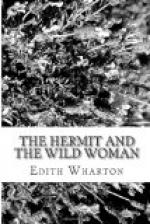Yes—I could just manage to see it—the first portrait of Jack’s I had ever had to strain my eyes over! Usually they had the place of honour—say the central panel in a pale yellow or rose Dubarry drawing-room, or a monumental easel placed so that it took the light through curtains of old Venetian point. The more modest place became the picture better; yet, as my eyes grew accustomed to the half-light, all the characteristic qualities came out—all the hesitations disguised as audacities, the tricks of prestidigitation by which, with such consummate skill, he managed to divert attention from the real business of the picture to some pretty irrelevance of detail. Mrs. Gisburn, presenting a neutral surface to work on—forming, as it were, so inevitably the background of her own picture—had lent herself in an unusual degree to the display of this false virtuosity. The picture was one of Jack’s “strongest,” as his admirers would have put it—it represented, on his part, a swelling of muscles, a congesting of veins, a balancing, straddling and straining, that reminded one of the circus-clown’s ironic efforts to lift a feather. It met, in short, at every point the demand of lovely woman to be painted “strongly” because she was tired of being painted “sweetly”—and yet not to lose an atom of the sweetness.
“It’s the last he painted, you know,” Mrs. Gisburn said with pardonable pride. “The last but one,” she corrected herself—“but the other doesn’t count, because he destroyed it.”
“Destroyed it?” I was about to follow up this clue when I heard a footstep and saw Jack himself on the threshold.
As he stood there, his hands in the pockets of his velveteen coat, the thin brown waves of hair pushed back from his white forehead, his lean sunburnt cheeks furrowed by a smile that lifted the tips of a self-confident moustache, I felt to what a degree he had the same quality as his pictures—the quality of looking cleverer than he was.
His wife glanced at him deprecatingly, but his eyes travelled past her to the portrait.
“Mr. Rickham wanted to see it,” she began, as if excusing herself. He shrugged his shoulders, still smiling.
“Oh, Rickham found me out long ago,” he said lightly; then, passing his arm through mine: “Come and see the rest of the house.”
He showed it to me with a kind of naive suburban pride: the bath-rooms, the speaking-tubes, the dress-closets, the trouser-presses—all the complex simplifications of the millionaire’s domestic economy. And whenever my wonder paid the expected tribute he said, throwing out his chest a little: “Yes, I really don’t see how people manage to live without that.”
Well—it was just the end one might have foreseen for him. Only he was, through it all and in spite of it all—as he had been through, and in spite of, his pictures—so handsome, so charming, so disarming, that one longed to cry out: “Be dissatisfied with your leisure!” as once one had longed to say: “Be dissatisfied with your work!”




